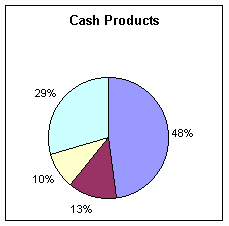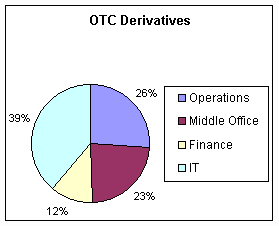Equity And Debt 2000
Wednesday, 14 February 2001By Now&ZYen
Growth Of Outsourcing In Investment Banks Supported By Cost Study Of Equity & Debt Markets
Financial products, particularly Derivatives, are costly for banks to process in-house, reports a new survey by Z/Yen, the City-based Risk/Reward Management firm. Shrinking margins are forcing banks to reduce costs per trade, which range from $10 for a Cash Equity to $2,000 for processing of a 5-year Swap. Outsourcing and insourcing are thus becoming accepted ways of staying competitive on costs per trade.
The study shows that smaller investment banks with lower volumes cannot compete on costs and should be keenest to outsource.
Larger investment banks, which should already benefit from economies of scale, can continue to reduce their costs per trade by insourcing additional volume. This study provides evidence to justify the trend for larger investment banks to set up processing utilities, e.g., JP Morgan’s Arcordia and Deutsche Bank’s European Transaction Bank.
Jeremy Smith, Director of Financial Services at Z/Yen, said, "It is clear than the market for commercialising processing services is primed for growth. Banks will have to decide whether they want to insource or outsource".
The study was carried out by Z/Yen and a consortium of 10 major US and European Banks. The scope of the study was to compare and contrast Operations, Middle Office, Finance and IT costs for 21 individual financial products within 9 nine major product areas (see below):
| Cash Products | OTC Derivative Products |
|---|---|
|
Cash Equities Stock Borrow/Loan Convertible Bonds Bonds Repo Exchanged Traded Derivatives |
Equity Derivatives Interest-Rate Derivatives Credit Derivatives |
Each bank provided detailed cost, volume and headcount data for a full-year. Over 18,000 data points were gathered, analysed and consolidated into a set of comparative benchmarks. The product scope included both primary and secondary trading in the European Market.
Cash Equities are the cheapest Cash Product to process - followed by Exchange Traded Futures and Options. Bonds and Repos are the most expensive.


- The cost per trade for OTC Derivatives is far higher than for Cash Products. The cost of processing an OTC Derivative is 10 to 15 times higher than its corresponding Cash Product, even though banks have spent huge amounts on automation.
- Even Vanilla OTC Derivatives are expensive to process. For a vanilla interest-rate swap, it costs an average of $260 to process a new deal and $350 per year to maintain the trade (risk, P&L, rate sets and payments). This means that the average cost of a 5-year swap is approximately $2000.
- Emerging Markets costs are higher than the major markets. The processing cost of an Emerging Markets bond is twice that of a Government or High Grade bond.
- Costs per Trade vary widely between banks, therefore, there is plenty of room to reduce costs further across the market. While many of the participants had broadly similar product profiles, costs ranged widely. In some (but not all cases), smaller banks had the highest cost per trade, while those that had centralised their operations tended to benefit from economies of scale (see point 9 below).
- Costs per Trade ranges were wider for OTC Derivatives than Cash Products showing that these products are still "settling in". Future savings could be large. For example, for OTC Equity Options, the costs per trade reported were from $40 to $900 whereas all the high-volume banks could process a new Cash Equity for less than $30.
- The technical expertise required for new products pushes up costs. The fully-loaded cost per head (including accommodation and office technology as well as staff costs) ranged from $120,000 to $140,000 for most products. However for Credit Derivatives, the average cost for the Middle-Office was $175,000.
- Banks with the largest volumes tend to have the lowest costs per trade. For all products, there was a correlation between high volume and low cost, i.e., economies of scale. A bank with an annual trade volume of 1 million trades a year is likely to be 65% more expensive than one with a volume of 4,000,000 per year. Thus, low volume banks are unlikely to be competitive.
New Studies
Z/Yen is now launching two further studies:
- Foreign Exchange and Money Markets - 2001
- Equity and Debt - 2001
Work has already commenced with the participants of the 2001 studies to define the model for data collection. Data will be collected in February/March 2001 and results published in April/May 2001. For further details, please call Jeremy Smith at Z/Yen on (020) 7562 9562.
About Z/Yen
Z/Yen's mission is to be the foremost risk/reward management firm. Risk/reward management is the application of risk analysis and return incentives to strategic, systems, human and organisational problems in order to improve performance. Z/Yen believes that the intelligent management of risk is the basis of significant reward. By recognising, understanding and managing risks, more risk can be assumed and performance increased. Z/Yen applies risk/reward management in the public, private and not-for-profit sectors in areas as diverse as finance, information technology, human resources, research & development, environment, quality, sales & marketing.Z/Yen's slogan is "zest for enlightenment", embodied in five distinguishing principles:
- Investing in clients;
- Investing in partners;
- Improving ourselves;
- Retaining and developing innovation and humour;
- Sharing the rewards.
Z/Yen has developed a risk/reward methodology based on analytical techniques from a number of fields which manage risk. The methodology consists of a strategic framework, supporting software, procedures, case studies and report formats. The methodology has been applied to strategic planning, financial planning, information technology planning, marketing plans, fraud investigations, reserves analysis, systems reviews, cost-effectiveness studies and human resource planning.Z/Yen's strategy is based on three approaches:
- Enhancement of the risk/reward methodology;
- Management consultancy projects to identify ventures;
- Development of a partner network.
Z/Yen organises its work in projects with a specific proposal for each phase and strong project management. Z/Yen is committed to sharing the risks and benefits of work with clients, often in the form of performance-related fees, and measuring work in quantitative or qualitative terms. Z/Yen has access to venture capital and, where appropriate, can provide a combination of financial and advisory services in exchange for equity or other stakes.Z/Yen applies its techniques with confidence in a variety of areas, but has stronger experience in technology, insurance, banking, media, health, distribution, charities and business to business services. Z/Yen has three partners, over ten staff and more than 50 associates. Staff share significantly in the benefits of success and Z/Yen seeks to develop a supportive environment in which professionals from a variety of disciplines can flourish.
Z/Yen in Financial Services
Financial Services is an industry where risk and reward are clearly present in day-to-day decisions. As the leading risk/reward management firm, Z/Yen is ideally suited to helping institutions make decisions in the areas of strategy, systems, people and organisation. Z/Yen’s proprietary risk/reward methodology is not only culturally suited to the industry, but unifies strategies from the boardroom to the trading floor, from headquarters to the counter/ATM, from central office to the customer call centre.Z/Yen’s work spans investment banking, investment management, retail banking, building societies, credit card companies, central financial exchanges, financial information and financial system providers, including ‘front’, ‘back’, ‘middle’, ‘sell-side’ or ‘buy-side’. The type of work ranges from strategic planning, through information systems planning, transaction costing (benchmarking), market segmentation, new electronic market simulations, queuing models for counters, correspondent banking restructuring, computer systems installation, management information systems design, new product/Internet product design and outsourcing.In the last year, Z/Yen has undertaken the following client assignments in the Financial Services arena:
- Development of marketing documentation for a European software house;
- Commercialisation strategy for an internal consulting group of a major bank;
- Benchmarking study for the Equity and Debt Markets which compared costs per trade for 10 major banks;
- Benchmarking study for the FX and Money Markets (ongoing);
- Development of a Stock Exchange Trading Game for a "DotCom";
- Market survey of the OTC Derivatives Market.
Z/Yen participates actively in organisations that are attempting to expand the boundaries of financial research, for example, the Centre for the Study of Financial Innovation. Z/Yen was the founder and concept developer of a £1.9 million joint research initiative, The Financial Laboratory, which won a 1996 DTI Foresight Challenge award.Institutions cannot afford to stand still in a competitive market. With the advent of T+1, new entrants to the industry and continuing pressures on staff, a robust risk/reward response is vital. Z/Yen is the natural partner for institutions seeking positive changes in response to their environment.
For further information, please call Jeremy Smith at Z/Yen on (020) 7562 9562.